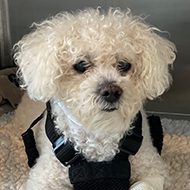
Bella Rose has made a good recovery following tumour removal.
A bichon frise has a new lease of life after veterinary specialists operated on a brain tumour which was causing her loss of balance and movement.
Andrea Wadey, owner of 10-year-old Bella Rose, noticed that Bella had become unsteady on her legs, was falling over frequently, and has started to toilet in the house.
When Bella was taken for a veterinary check, she was swiftly referred to Davies Veterinary Specialists for urgent neurology care.
Neurologist at Davies, Alex Forward, performed an MRI scan on Bella. The results revealed a large brain tumour on her cerebellum, which is vital for coordination and movement.
Mr Forward explained: “We spoke to Bella’s owner about the options and after careful consideration she elected for surgery to remove the tumour.
“We had to remove a section of the skull to access the back of her brain to enable us to excise as much of the mass as possible. Bella was understandably a bit wobbly after surgery but recovered well and was able to go home seven days later.
“The tumour was analysed and returned as a meningioma, which is the most common type of brain tumour in dogs.
“These are also one of the most common brain tumours found in people and arise from cells in the meninges, which are layers that line the surface of the brain.”
Bella has made a good recovery from her surgery, and is reportedly far more interactive and excited.
Mr Forward added: “She has also started going to the toilet outside again and is otherwise well in herself. Our fingers are firmly crossed that she will continue to do well.”
Images (C) Davies Veterinary Specialists



 The RCVS has announced a new version of its 1CPD mobile app, with enhanced features for veterinary surgeons and veterinary nurses to record their continuing professional development.
The RCVS has announced a new version of its 1CPD mobile app, with enhanced features for veterinary surgeons and veterinary nurses to record their continuing professional development.